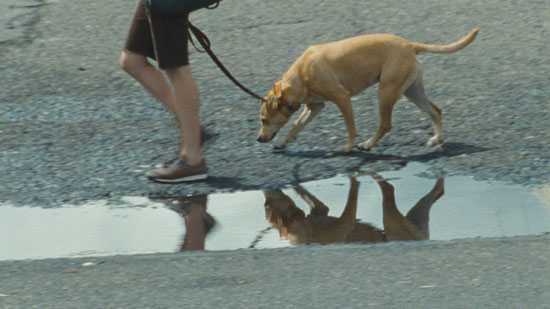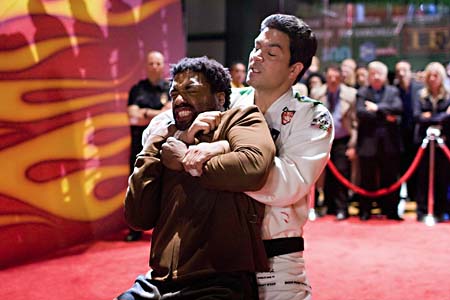When the big studios fail you, you have to go independent, or if not independent the dusky tracking shot of the Pacific Northwest that brings you into Wendy and Lucy.

All fans of Old Joy mention that the film depicts an awkwardly realistic male friendship, which we rarely see onscreen. People praise the "quiet" (I most liked the left wing radio through line). So I was attracted to the purported similarity between Wendy and Lucy and Old Joy. But I quickly came to realize that Kelly Reichardt has essentially replaced Will Oldham with a dog (ohmigosh did you know Lucy is actually Reichardt's dog in real life?!?). And the entire narrative is structured around this dog, whose rescue is Wendy's sole purpose, until she is found and promptly abandoned to the obese man (who must be okay because he drives a Prius). For that reason alone I dismissed the film.

I wonder how much of the praise for Wendy and Lucy is motivated by the present financial situation in America--it's a movie about the tough choices of poverty, choices that many more Americans might be facing soon. But I don't think current events excuse stylistic blandness or lend some kind of special gravity to Wendy's plight. The security guard's lines "You have to have a job to get a job. You have to have an address to get an address," strain too hard and lay out the director's motivations too clearly. I say you can still have fun at a recession picture--take Dinner at Eight, for example. That film is witty, sad, fast-paced, unconventionally structured and 75 years old. The only moment of levity I can recall in Wendy and Lucy is the security guard covertly handing Wendy what appears to be $16.
I think Reichardt's biggest asset as a director might be that Will Oldham is apparently willing to work on all her projects. Just the way he barks, "king salmon" blows me away. Next time, could we have the Bonnie "Prince" talk extemporaneously for 80 minutes on any topic of his choosing? Or give a Matewan-style sermon in the woods?
Furthermore:
WTT Top 5 Ways to Make Wendy and Lucy More Interesting:
1. Create a shocking backstory (e.g. Wendy killed the Old Joy dude with the power of her wounded glare and stole his dog)
2. Have Will Oldham rescue Wendy by telling the creepy forest vagrant a tale about wayward heavy machinery
3. Show Wendy's bus passing a car rental agency, so her failure to visit one is all the more baffling
4. Put in more symbolic graffiti (a la the "Goner" tag that Wendy passes)--perhaps a George Bush "Obey" piece
5. Conclude the film by having the black Bob Dylan kid from I'm Not There pop out in the boxcar and play Wendy a blues
All Wendy and Lucy fans can rest assured though--I saw a far worse 2008 film this week: Redbelt. You watch it and tell me if you believe "There Is Always an Escape."

Where many directors decline into mediocrity as they age, David Mamet has chosen to dive directly off a cliff into incoherent drivel. It's one thing if the direction on the action shots is hard to follow--it's another when the dialogue is so terse it becomes nonsense. I can't remember an film that combined more wooden acting with more wooden dialogue. Hearing Alice Braga's peanut butter-mouthed Brazilian pronunciation of Mamet's words was like having an old Band-Aid pulled off my skin as slowly as possible. Emily Mortimer didn't act so much as squinch her eyes in disgust at the script. I would reserve my highest praise for Chiwetel Ejiofor and say that, in brief flashes, he appeared to be sentient. Even if Mamet's characters in House of Games and The Spanish Prisoner were merely grim vessels for writerly bile, at least those films are competent. When you reach the hasty climax of Redbelt (featuring a red belt!) you will only be ashamed that you held out for as long as you did.
On the plus side, Redbelt does confirm that Tim Allen is still alive (not to mention Rebecca Pidgeon, Ricky Jay, et al).







